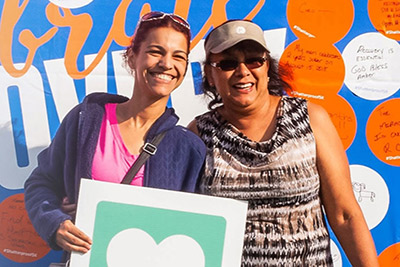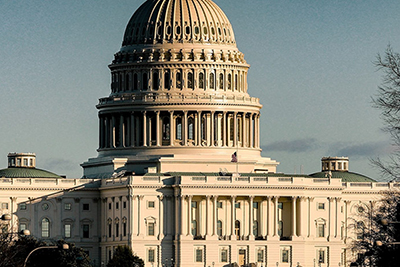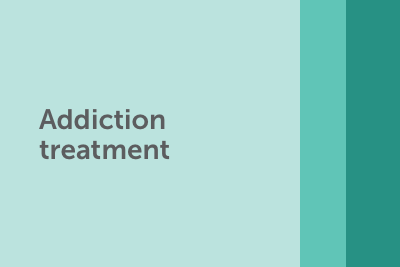
Addiction in America
Almost 49 million Americans are living with addiction, but many don’t get the treatment they need.
It doesn’t have to be this way.
The addiction crisis is worse than ever.
Nearly 49 million Americans aged 12 or older had a substance use disorder (SUD) within the past year. That means that one in every six American adults is living with a substance dependence.
Drug overdose is the leading cause of accidental and preventable death in the U.S. Additionally, our country reports more overdose deaths than any other country. One in every three American adults has lost someone to a drug overdose.
Provisional data from 2024 estimates that 87,000 people died by drug overdose in the U.S. over a 12-month period. An unprecedented portion of these deaths involved fentanyl, a powerful, often illegally made synthetic opioid. Fentanyl is now the top cause of death for Americans aged 18 to 49 — more than car crashes, gun violence, or suicide.
Alcohol use is the third leading preventable cause of cancer in the U.S., after tobacco and obesity. One in every nine Americans aged 12 or older — more than 10% of the population — had an alcohol use disorder within the past year.
Addiction is often punished instead of treated.
Addiction is one of the only medical conditions that is often treated like a crime. But punishing people doesn’t stop drug use or overdoses.
On any given day, more than 360,000 people are incarcerated for drug offenses in the U.S. In 2023, there were an estimated 870,874 arrests for drug abuse violations — nearly 90% of which were for drug possession. An estimated 60% of incarcerated individuals meet the criteria for substance use disorder in the U.S.
Addiction affects everyone.
-
Economic impact: Addiction costs the U.S. more than $1 trillion a year in healthcare, lost productivity, and criminal justice related costs.
-
Healthcare system: Overwhelmed emergency rooms, increased hospitalizations, and long-term treatment needs are putting more strain on the system. One federal analysis projects that by 2036, the U.S. will face significant workforce shortages in the addiction treatment field.
-
Family and communities: Addiction contributes to separated families, homelessness, and involvement with the criminal justice system. One in every three adults report that they or a family member has had an opioid use disorder.
-
Racial disparities: Stigma and racism make it harder for people of color to get fair, compassionate, and effective treatment. Black, Indigenous, and Latinx individuals are estimated to have the highest rates of fatal overdose and, in some areas, the highest rates of drug and alcohol use disorders.
There are many challenges to ending the addiction crisis.
-
Access to care: Many communities — especially rural and low-income areas — lack treatment services. This creates barriers for people to get help when they need it. Less than 5% of Americans with substance use disorder get any treatment and only 6% receive treatment via telehealth.
-
Stigma and shame: Addiction is widely misunderstood. 57% of the public believes a person living with substance use disorder is not trustworthy. It is often seen as a moral failing, rather than a medical condition. Negative stereotypes keep people from seeking care and contribute to public policies that punish people, rather than promote recovery.
-
Fentanyl and polysubstance use: Fentanyl is often mixed with other substances, increasing the risk of fatal overdoses and complicating treatment. In 2024, the Drug Enforcement Administration (DEA) seized the equivalent of more than 377 million lethal doses of fentanyl.
-
Lack of medical training: Only one in every four doctors or nurse practitioners receive addiction training. Most healthcare providers receive little to no training in addiction care, leading to missed diagnoses and ineffective treatment plans.
-
Insurance barriers: Only 60% of employer health plans cover addiction medications. Many insurance plans do not cover evidence-based treatments or place restrictions that delay access to lifesaving care.
-
Racial disparities: People of color face greater barriers to accessing treatment in the U.S. Data shows that they are less likely to receive medications for addiction and face harsher legal consequences.
-
Underfunded services: Despite the size of the crisis, funding for addiction treatment, prevention, and harm reduction remains inadequate in many regions.
What’s being done to help?
The addiction crisis is costing lives and money across the country, but there is hope.
We can save lives by making treatment more available, affordable, and based in science. We need to treat addiction like the health condition it is, not a crime or a failure.
Together, we must keep pushing for change. Browse our national program work and explore ways that you can help so that everyone has the chance to find their own path to recovery.

Our Work
We're committed to ending the devastation caused by the disease of addiction. Understand how we're making this happen.

Advocacy
It’s time to listen to experts, learn from the evidence, and implement strategies to get things done — fast. Change starts with you.

Treatment Options
Addiction is highly treatable—but that treatment must be rooted in evidence and scientific best practices. Learn about what works best.

